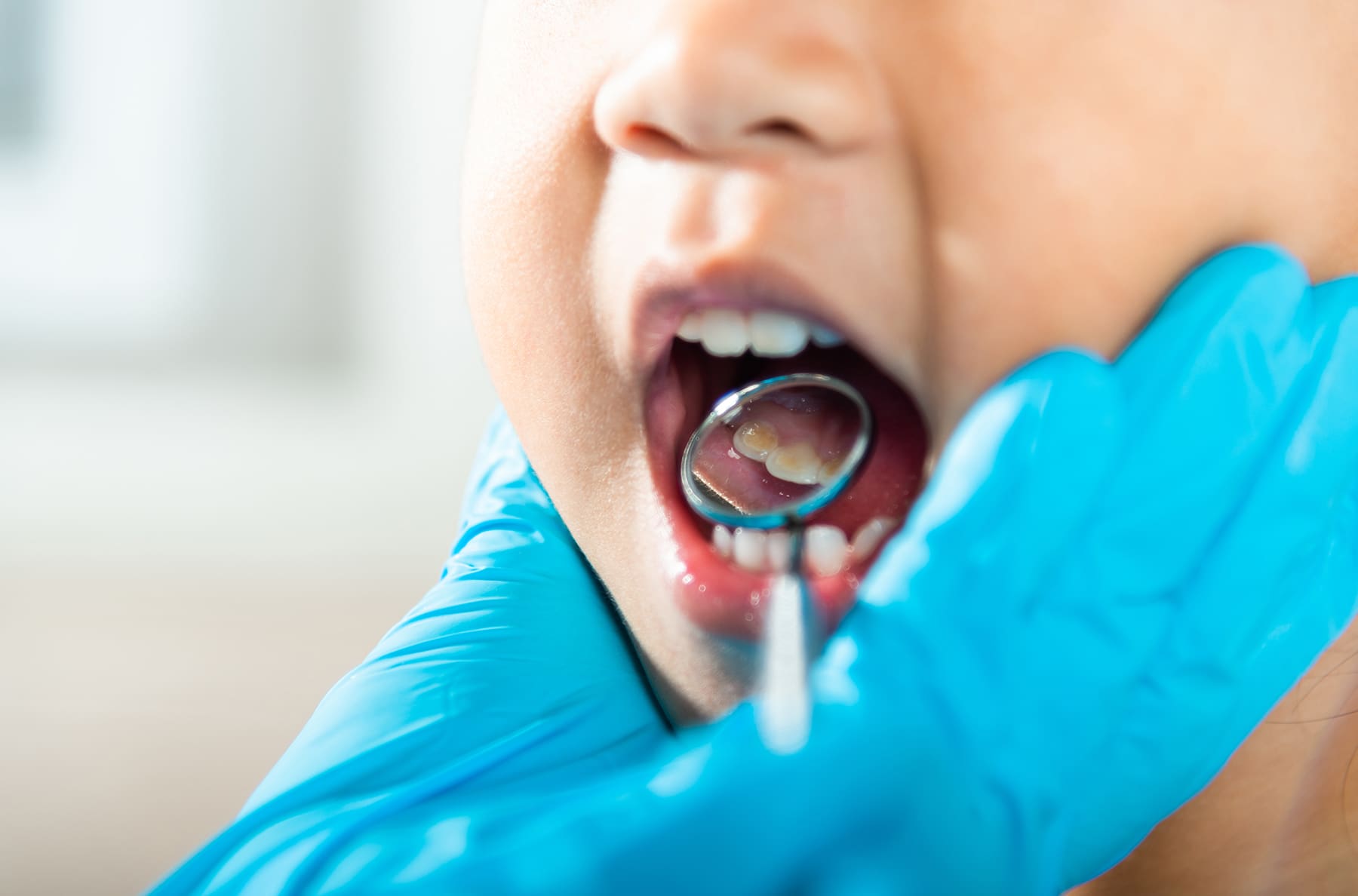Reviewed By Dr. Jodi Kuhn
Reading time: 3 minutes
Tooth decay is one of the most common chronic conditions in children, but it should never be ignored. While baby teeth will eventually fall out, untreated cavities can lead to pain, infection, and potential long-term oral health problems.
So what happens if a child has a cavity? In this blog, you will learn how dentists identify and treat cavities in kids, when a filling is needed, and how newer treatments like SDF can help stop decay without an invasive procedure.
We offer preventative dentistry procedures for the whole family at our offices in Denver, Aurora, Thornton and Hampden.
Table of Contents
Key Takeaway
Cavities in baby teeth can cause pain, infection, and long-term dental problems if untreated. Fortunately, gentle and effective options like dental fillings and SDF cavity treatment make care easier than ever.
What Youth Dentistry & Orthodontics Offers for Cavities
We treat cavities in baby and adult teeth using the most up-to-date and gentle care. Treatment may involve:
- Tooth-colored dental fillings
- Minimally invasive options like SDF cavity treatment
- Patient education to prevent future decay through good dental hygiene and fluoride treatments
We accept Medicaid and welcome families to all our Colorado locations.
The Importance of Treating Cavities in Baby Teeth
Some parents wonder, “Do I really need to treat a baby tooth if it is going to fall out anyway?” The answer is yes, here is why:
- Cavities cause pain: Your child might avoid eating cold foods or have trouble sleeping due to discomfort.
- Infection can spread: Untreated cavities can lead to abscesses or affect neighboring teeth.
- Speech and development suffer: Missing or painful teeth can affect how your child speaks or chews.
- Permanent teeth can be damaged: Infection from a baby tooth can reach the underlying adult tooth bud, risking future dental health.
5 Early Warning Signs of a Cavity
Cavities can develop slowly, but noticing the signs early can help prevent more serious damage. Here are some common signs to watch for:
- White spots or dark spots on the tooth’s outer surface
- Sensitivity to hot, cold, or sweet foods
- Bad breath that will not go away
- Complaints of tooth pain, especially while eating
- Swelling or redness near the gums, which can be signs of infection
Even if your child has no symptoms, dental X-rays and regular checkups often catch cavities early, before they cause serious damage to the protective layer of the tooth.
How We Treat Cavities in Kids
Cavity treatment for kids depends on the location and severity of the decay:
1. Silver Diamine Fluoride (SDF) Cavity Treatment
If the cavity is small and your child is very young or anxious, SDF might be used instead of a traditional filling. This antimicrobial liquid:
- Stops decay from growing
- Hardens the tooth surface
- Requires no drilling
- Is applied in seconds
Parents should know that SDF leaves a dark stain on the decayed tooth, but it is often worth it to avoid sedation or drilling.
2. Dental Fillings for Kids
For deeper cavities, composite fillings are used to:
- Remove decayed tooth material
- Fill and seal the hole using direct restorations
- Restore tooth function and appearance
We use local anesthesia to keep kids comfortable. In some cases, we may recommend sedation dentistry if your child needs extra help relaxing. If a large portion of the tooth is affected by decay, we may recommend a dental crown instead of a filling.
What Happens If You Don’t Treat a Cavity?
Delaying treatment can lead to:
- Pain and swelling that interfere with eating, school, and play
- Tooth loss and gaps that cause crowding of future adult teeth
- Infection that may require antibiotics or emergency care
- More expensive treatments down the road
Untreated tooth decay can affect your child’s oral health for years to come. Early intervention prevents stress, saves natural teeth, and keeps dental costs lower.
Pro Tips for Parents
Establishing strong oral care habits early can help prevent cavities and ensure your child’s smile stays healthy. Here are some helpful tips:
- Help your child brush their teeth twice a day with a pea-sized amount of fluoride toothpaste until they are old enough to do it on their own.
- Floss at least once a day. If your child has trouble flossing with regular string floss, choose kid-friendly options like kids flossers or a water flosser.
- Encourage healthier snack choices, like fruits or cheese, and limit sugary or starchy snacks. These foods can lead to plaque buildup, which can harm your child’s teeth over time.
- Schedule regular dental checkups starting at age 1 or when they have two teeth that touch.
Schedule Your Child’s Visit Today
At Youth Dentistry & Orthodontics we provide complete cavity treatment for kids with a compassionate touch. We accept Medicaid and offer convenient locations across the Denver metro area.
Schedule an appointment at one of our four locations:
📍Denver Youth Dentistry and Orthodontics: 1400 Grove Street, Denver, CO 80204 | (303) 825-2295
📍Aurora Youth Dentistry and Orthodontics: 14251 E. 6th Avenue, Aurora, CO 80011 | (303) 343-3133
📍Thornton Youth Dentistry and Orthodontics: 550 E. Thornton Parkway, Suite 240A, Thornton, CO 80229 | (303) 280-8878
📍Hampden Youth Dentistry and Orthodontics: 7400 East Hampden Ave. Unit C1, Denver, CO 80231 | (720) 826-3694


